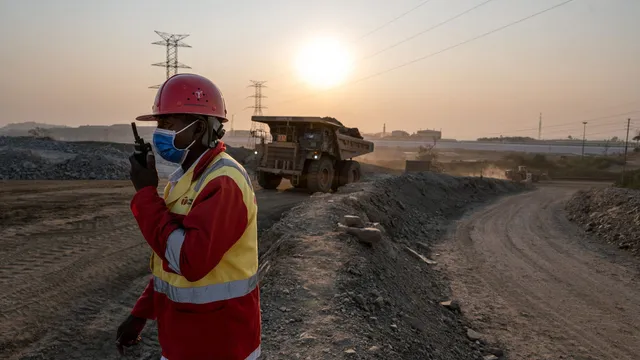
Congo loses control over crucial mineral resources amid civil war
2025-03-15 08:00- The Democratic Republic of the Congo is trying to sell its mineral resources to U.S. companies despite control issues.
- Significant mineral wealth is already dominated by Chinese and rebel entities, raising concerns about ownership and management.
- The ongoing civil unrest complicates any potential U.S. involvement in mineral extraction and raises questions on military support.
Express your sentiment!
Insights
The Democratic Republic of the Congo (DRC) is in a complex crisis involving its mineral wealth and control by various factions. Analysts indicate that the DRC is attempting to engage the United States to sell minerals worth over $20 billion, including gold and copper, which are essential for American interests. However, much of these resources are currently controlled by rebel groups and foreign entities, particularly China, which dominates the mining sector. The conflict has made it challenging for the DRC government to claim ownership or profit from these deposits as a significant portion is in the eastern regions, where foreign-backed militias operate. The M23 rebel group is among the numerous factions vying for control, and recently, they have signaled a willingness to participate in peace talks with the DRC government. Despite these efforts, the ongoing violence and instability raise concerns over the future exploitation of these critical minerals. The U.S. International Trade Administration has noted the DRC’s immense mineral potential, yet a noted percentage of these opportunities has already been secured by Chinese companies, highlighting the competitive international interests at play. The prospect of the U.S. establishing a presence in the DRC for mineral extraction purposes has prompted discussions about potential military involvement to secure the mines. This would pose a significant dilemma for the current U.S. administration, which aims to reduce military conflicts overseas while still remaining competitive in the global mineral market, particularly in the face of growing Chinese influence. Foreign stakeholders are likely to oppose such U.S. moves, fearing a shift of power that could minimize their established holdings. As the situation develops, it remains to be seen how the proposed negotiations with the rebel forces will impact the DRC's mineral rights and the overall stability of the region. The likelihood that rebel forces continue to retain control over valuable mineral assets complicates the possibility of collaborative ventures with U.S. firms, which are eager to participate given the right conditions and support from local authorities. The call for U.S. military presence in exchange for economic partnerships underscores broader geopolitical tensions as the U.S. and China vie for dominance in strategic mineral resources, particularly cobalt, essential in various technologies, including electric vehicles and batteries.
Contexts
The history of mineral exploitation in the Democratic Republic of the Congo (DRC) is marked by rich natural resources and significant political, social, and economic challenges. The DRC is home to vast deposits of minerals, including cobalt, copper, diamonds, and gold, which have attracted both domestic and international interests. Exploitation of these resources has been occurring for centuries, but it intensified during the colonial period when Belgian rule established a framework for mining that prioritized extraction over the welfare of local populations. The legacy of this exploitative system created deep-rooted socio-economic inequalities and laid the groundwork for future conflicts over resource control. Following the DRC's independence in 1960, control over mineral resources became a focal point of political strife. Mobutu Sese Seko’s regime, which lasted until the late 1990s, was characterized by widespread corruption and mismanagement of the mining sector. State-owned enterprises dominated the industry, and the lack of infrastructure stifled sustainable development. The collapse of Mobutu’s regime led to the First and Second Congo Wars, where various armed groups fought for control of mineral-rich regions, further exacerbating human rights violations and exacerbating the humanitarian crisis in the country. The wars drew in neighboring countries, transforming resource-rich areas into battlegrounds for regional power struggles. In the post-war era, international corporations and foreign governments have continued to exploit the DRC's mineral wealth, frequently disregarding environmental standards and the rights of local communities. The rise of electronic technologies, which require minerals such as cobalt, has generated renewed interest in the country’s resources. Moreover, international initiatives to regulate supply chains, like the OECD Due Diligence Guidance, have emerged in an attempt to curb the financial benefits that conflict minerals provide to armed groups. However, the effectiveness of such initiatives remains a topic of debate, as challenges such as informality in the mining sector, illegal mining, and lack of transparency persist. Currently, the DRC continues to face significant challenges in managing its mineral wealth. While there are efforts to establish legal frameworks and promote sustainable practices within the mining industry, issues such as corruption, inadequate infrastructure, and ongoing instability in certain regions continue to undermine progress. The country’s potential for economic growth through responsible mineral exploitation is substantial, yet it heavily depends on overcoming historical injustices, enhancing governance, and improving the lives of communities dependent on these resources. Addressing these multifaceted challenges is crucial for achieving a more equitable and sustainable future for the DRC and its citizens.